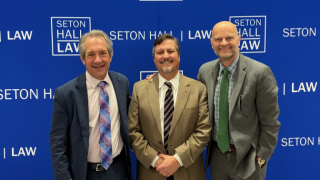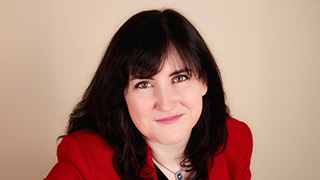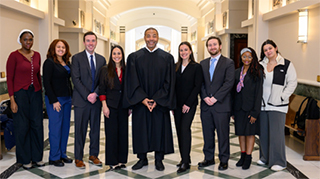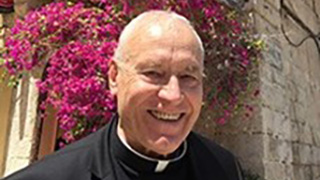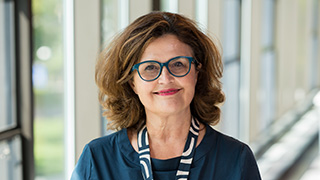Institute for Communication and Religion: Spring 2025 Semester of Scholarship
Monday, June 2, 2025

Institute for Communication and Religion Director Jon Radwan, Ph.D.
The Institute for Communication and Religion, an affiliated unit within the College of Human Development, Culture and Media (CHDCM), reports a very productive spring semester. New events, scholarship and podcasting all contributed to understanding how religion, communication and media build meaning. This recap story features links to all related ICR content.
Events
ICR Director Jon Radwan, Ph.D., leads “Team Contact,” a research group studying corporeality, rhetorical touch and incarnational meaning. In January, Radwan, Cyphert, Gorsevski and Swartz published Ethics in Contact Rhetoric: Communication and the Dance of Bodies and Power, the newest volume in the Studies in Contemporary Rhetoric series from Lexington Books.
On April 30, Radwan hosted a book talk at Walsh Library and spoke on the theme, “How Should We Draw Communication?” He used the challenge of drawing the book’s cover and the chapter diagrams to develop a thesis about communication ethics. According to Radwan, a “humane way to draw communication is by centering interpersonal contact and tracing degrees of mutuality and balance within our embodied relational cycles. These cycles form our social and personal dances. The art of dance is not just a metaphor; ‘choreutics’ provide a useful vocabulary for discerning ethics, meaning and value within contact patterns.” Adria Kitzinger, a student in Radwan’s COMM 1610 Interpersonal Communication course, explained she was inspired by this project and studied it as the subject of her class paper. “I explored the idea that all humans need contact in order to survive — not just physical touch, but emotional and communicative contact. The choreutic model of communication, with its emphasis on the interaction between stroke and strike, highlights how mutual, ongoing care is necessary for anyone to thrive. It [communication] is not just about sending messages,” Kitzinger said. Video of the event is available on Seton Hall’s YouTube channel.

Mara Einstein, Ph.D.
The ICR also hosted Mara Einstein, Ph.D., author and professor at Queens College (CUNY), for a book talk on March 19 on her recently published book, Hoodwinked: How Marketers Use the Same Tactics as Cults. Einstein discussed the similarities between the methods cults use to attract followers, and the message strategies marketers use to attract customers. She was inspired to do so after researching documentaries. Films on cults, and films on multi-level marketing schemes, showed many similarities. Marketers aim at more than moving product; they profit from successfully shaping identity and a sense of belonging. Her book seeks to make consumers aware of unethical tactics, and to encourage them to think more critically about the content they consume online.
Scholarship
Through the ICR, Seton Hall University has become a full partner of Interreligious Studies Media, a non-profit organization that funds and produces the Journal of Interreligious Studies (JIRS). The journal, which is a peer-reviewed digital publication, was originally founded in 2009 by the Andover-Newton Theological School. JIRS features research on how religious people, groups and traditions interact socially, especially as they engage with people from differing traditions.
Jon Radwan and Angela Kariotis, a Communication alumna and former Seton Hall instructor, had their co-authored article, “Right Out the Gate: A Performative Auto-Ethnography on Race, Place and Faith” published this spring in Religions, an open-access, peer-reviewed journal on religions and society. The article discusses the efforts of Monsignor Thomas G. Fahy, who served as Seton Hall’s president from 1970 to 1976, to build collaborations between the Seton Hall community and Newark racial justice activists during America’s Civil Rights Movement. The article is multi-modal, integrating audio files into autoethnographic context. On the digital media side, Kariotis performed and recorded four of Fahy archival texts to hold him up as a model local justice leader. In text, Radwan and Kariotis draw from personal experiences as members of the Seton Hall community to interpret dominant academic narratives on race and faith. The power of Fahy’s social justice rhetoric shows in recent curricular revisions. In 2019, CORE faculty collaborated to make Fahy’s 1970 presidential inaugural the first “framing” text freshmen encounter at Seton Hall.
ICR Podcasting Network
The ICR’s podcast series, CORECast, dropped two new releases this semester to wrap up an extended second season. CORECast hosts students and faculty discussing both religious and philosophical texts taught in Seton Hall’s Core Curriculum.
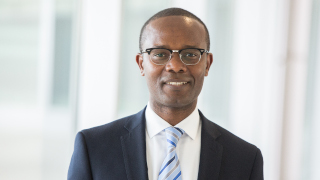
CORE Fellow Roger Alfani, Ph.D.
The second episode, “Refugees, Religion and Politics,” features CORE Fellow Roger Alfani, Ph.D. and Billy Austin, a Seton Hall junior in Political Science, with Seton Hall Communication alum Bernie Wagenblast as host. They discuss themes from Alfani’s book, Religious Peacebuilding in the Democratic Republic of Congo, and from Refugees, Religion and Politics, a third-level Core Curriculum course from the Catholic Studies program.
The third episode, “Julian of Norwich's 'Showings'”, features Teaching Fellow Erin Zoutendam, Ph.D., and Seton Hall student, Tristan Nguyen, with host Bernie Wagenblast. They discuss Showings, a book documenting the revelations that Julian of Norwich, a 14th century anchorite, experienced during a severe illness. Her revelations portray God as maternal and nurturing, and she also touches on the divine nature of love and sin.
These episodes, and our library of podcast content, are available now on the ICR’s PodBean.
Upcoming Projects
Inter/Sections, the ICR’s podcast partnership with the Journal of Interreligious Studies, will launch a new season in Fall 2025. It features scholars sharing top research on interfaith communication and social relations. Event planning is underway for 2025-2026 and will include Radwan and Kariotis addressing Fahy, and a CHDCM Truth-Teller's event on Dorothy Day. In addition, two grant proposals are under development.
About the Institute for Communication and Religion
The Institute for Communication and Religion (ICR) is an affiliated unit within Seton Hall University’s College of Human Development, Culture and Media. Religious traditions are primary drivers for social action across humanity’s full moral range, from care through violence. Launched with THRUST funding in fall 2017, the ICR is an interdisciplinary nexus for communication and media scholarship addressing the critical intersection between religion and society. Guided by Nostra Aetate’s spirit of ecumenical and interreligious cooperation, the Institute seeks to engage in public dialogue and debate, promote academic inquiry and support religious dimensions of creativity. Our values are Seton Hall’s values: servant leadership, curricular innovation and intellectual excellence.
Categories: Arts and Culture, Faith and Service


